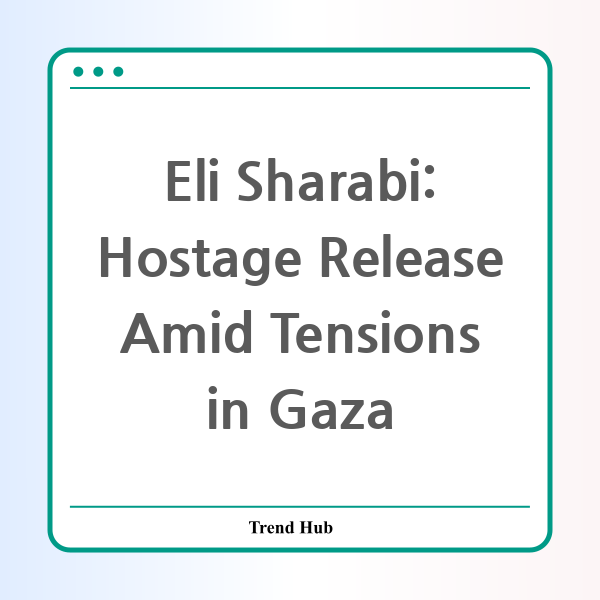* This website participates in the Amazon Affiliate Program and earns from qualifying purchases.

As the world watches the unfolding situation in Gaza, the recent release of Israeli hostages, including Eli Sharabi, has reignited a complex conversation around conflict, humanitarian issues, and the ongoing negotiations for peace. The emotional release of hostages from Hamas, particularly Eli Sharabi, who endured a harrowing 491 days in captivity, serves as a stark reminder of the personal toll taken by geopolitical strife.
In a dramatic handover that occurred in Deir al-Balah, three Israeli hostages: Eli Sharabi, Ohad Ben Ami, and Or Levy, were released to the Red Cross. This event marked the fifth phase of hostage exchanges under a ceasefire agreement that has temporarily paused hostilities between Israel and Hamas. The emotional scenes surrounding the handover showcased the frail condition of the hostages, which stirred widespread distress among their families and the public.
The conditions under which these hostages were held and released highlight the grim realities faced by many in the region. Initial footage revealed Eli Sharabi and his fellow hostages appearing visibly thin and shaken, suggesting a traumatic experience that underscores the severe psychological and physical impacts of long-term captivity.
Throughout the entire ordeal, the families of the hostages have been vocal and active in advocating for their safe return. The Hostages and Missing Families Forum has been instrumental in coordinating efforts for awareness and support, emphasizing that every hostage must be brought home. Their cries for action grow increasingly urgent as uncertainty looms over the remaining hostages, many of whom are believed to be still in Gaza.
The hostage crisis cannot be viewed in isolation. It is deeply intertwined with broader regional dynamics and the ongoing conflict, which has seen heavy civilian casualties and immense suffering on both sides. More than 45,000 people have been reported killed since the beginning of the hostilities, and the humanitarian situation in Gaza has deteriorated significantly. Many Palestinians are now facing dire shortages of food, shelter, and medical care, compounded by the psychological trauma of war.
Additionally, the negotiations for the release of remaining hostages are fraught with complexity. While the ceasefire has provided a temporary respite, the foundations for a lasting peace remain precarious. Leaders from both parties have expressed a commitment to finding a resolution, but deep-seated mistrust and conflicting objectives make this a challenging endeavor.
In an extraordinary twist during the handover, the hostages were reportedly coerced into making statements praising their captors, raising critical ethical questions about the manipulation of such crises for propaganda purposes. The Israeli public reacted with outrage to these orchestrated scenes, which were intended to project strength by Hamas and validate its narrative amidst ongoing military operations.
This incident has further intensified calls for accountability and the need for renewed dialogue focused on mutual respect and humanitarian considerations. Many experts argue that sustainable peace can only be achieved through comprehensive negotiations that take into account the rights, needs, and fears of both Israelis and Palestinians.
As the situation continues to evolve, Eli Sharabi's release serves as both a moment of hope and a grim reminder of the ongoing realities of conflict. It illustrates the need for continuous efforts toward peace and stability in the region, where lives have been irrevocably altered, and futures hang in the balance. The world watches, and many hope for a more humane resolution to a decades-long conflict that has brought suffering to so many.
* This website participates in the Amazon Affiliate Program and earns from qualifying purchases.